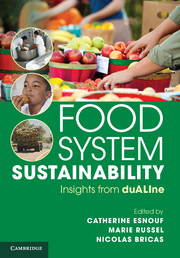Book contents
- Frontmatter
- Contents
- Foreword
- Acknowledgements
- Introduction
- 1 Context: new challenges for food systems
- 2 Consumption and consumers
- 3 Carbon footprint and nutritional quality of diets in France
- 4 Food systems
- 5 Industrial organisation and sustainability
- 6 Urbanisation and the sustainability of food systems
- 7 Losses and wastage
- 8 International trade, price volatility and standards for sustainability
- 9 Elements for a foresight debate on food sustainability
- 10 A critical panorama of methods used to assess food sustainability
- Conclusion
- References
- List of abbreviations
- List of duALIne experts
- Index
2 - Consumption and consumers
Published online by Cambridge University Press: 05 April 2013
- Frontmatter
- Contents
- Foreword
- Acknowledgements
- Introduction
- 1 Context: new challenges for food systems
- 2 Consumption and consumers
- 3 Carbon footprint and nutritional quality of diets in France
- 4 Food systems
- 5 Industrial organisation and sustainability
- 6 Urbanisation and the sustainability of food systems
- 7 Losses and wastage
- 8 International trade, price volatility and standards for sustainability
- 9 Elements for a foresight debate on food sustainability
- 10 A critical panorama of methods used to assess food sustainability
- Conclusion
- References
- List of abbreviations
- List of duALIne experts
- Index
Summary
Analysis of the medium- and long-term evolution of global food consumption highlights some striking regularities. This chapter addresses the potential consequences of a generalisation of these trends, before focusing on their determinants and in particular the factors that might alter current trends to promote greater sustainability. Six main areas are covered: the characteristics of long-term changes to diet, the international convergence of food models and evolution of the situation in Southern countries, the bio-physiological determinants of changes to consumption, the role of agricultural policies, the identification of factors that may change trends and, finally, the heterogeneity of consumption and nutritional inequalities.
One of the major issues addressed by this working group was to determine whether dietary trends and their underlying major determinants were the same in all countries, or whether on the contrary it was possible to identify differences that might indicate alternative pathways for change. The same concern led the group to look at break points in past consumption trends, concerning meat in particular, insofar as they might lead to a clearer understanding of the mechanisms underlying the alteration of long-term trends and the emergence of new dietary standards.
- Type
- Chapter
- Information
- Food System SustainabilityInsights From duALIne, pp. 27 - 50Publisher: Cambridge University PressPrint publication year: 2013
- 2
- Cited by



